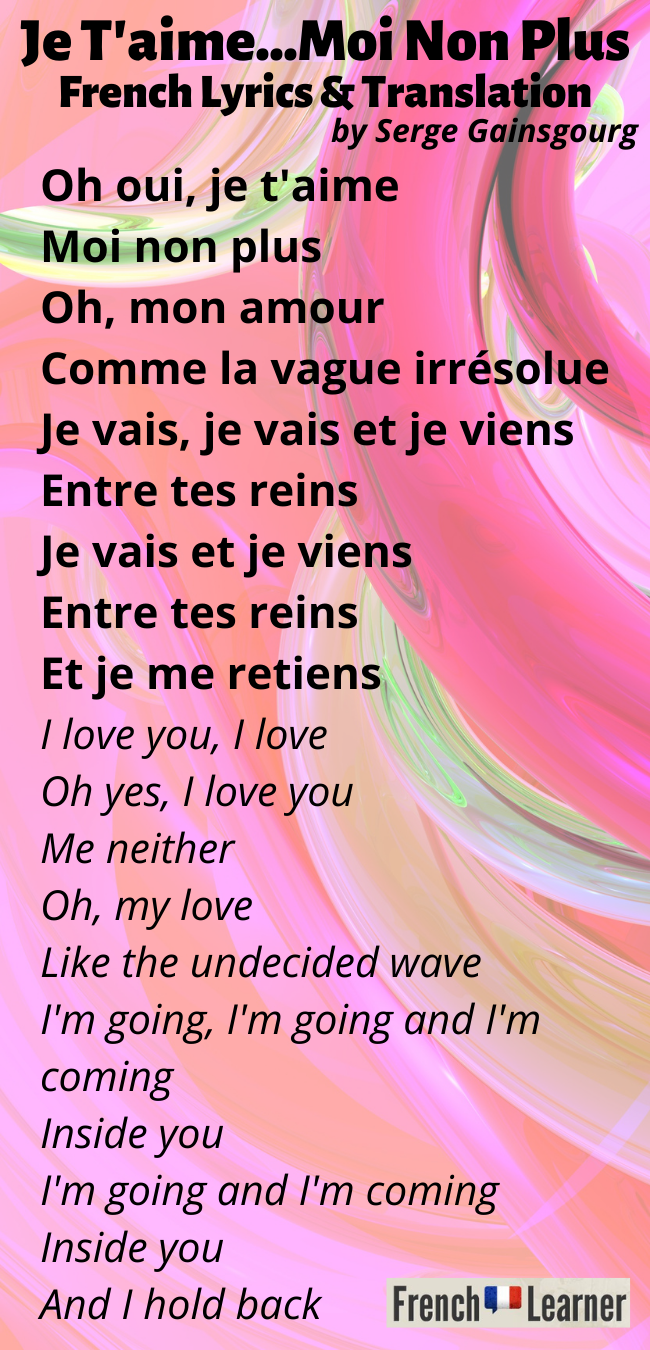
“Je T’aime…Moi Non Plus” (Meaning: I Love You…Me Neither) is the single most famous song of French singer Serge Gainsbourg (1928-1991). Gainsbourg wrote the song in 1967 and sang it with his then lover, Brigitte Bardot.
Two years later in 1969 Gainsbourg recorded the song with his then lover English singer Jane Birkin, who sadly just passed in July of 2023. Gainsbourg and Birkin’s version of the song went straight to the top of the international charts. This controversial song is best known for its racy and suggestive lyrics.

Je T’aime…Moi Non Plus Song Background
Many English speakers around the world simply refer to Je T’aime…Moi Non Plus as the “Je T’aime song” or the “I love you song”.
The song contains off color lyrics and indecent innuendos coupled with heavy breathing and panting. Due to this perceived risqué eroticism, the song was banned in a number of European countries and most notably by the BBC in the United Kingdom.
In 1976 the movie “Je t’aime moi non plus (I Love You, I Don’t)” was released. The film was written and directed by Gainsbourg with Jane Birkin staring in the film.

Listen to Je T’aime Moi Non Plus – YouTube & Spotify
The YouTube video is of Serge Gainsbourg and Jane Birkin singing Je T’aime…Moi Non Plus. Keep reading for the lyrics translation and analysis.
Listen to Je T’aime Moi Non Plus on Spotify:
Listen to the original release of Je T’aime…Moi Non Plus with Serge Gaisbourg and Brigitte Bardot.
Lyrics Analysis
Serge Gainsbourg and Jane Birkin sing the song together, alternating lines and verses. Basically, they sing about making love, with references to “going and coming”, holding back and Birkin singing, “Non, maintenant viens” (No, come now) at the end of the song.
In the section below, we’ve handpicked lines which we believe offer interesting insights into French vocabulary and grammar.
Je t’aime, je t’aime
The lines, “Je t’aime, je t’aime” translate to “I love you, I love you”.
Oh oui, je t’aime
The line translates to “Oh yes, I love you”. In addition to “oui”, this page covers 33 ways to say yes in French.
Moi non plus
The line “moi non plus” translates to “me neither”. In conversational French, when somebody makes a comment in the negation, for example, “Je n’aime pas le fromage” (I don’t like cheese), the other person can respond with this phrase, “moi non plus” (me neither or neither do I).
Moi non plus is the opposite of “moi aussi“, which translates to “so am I”, “so do I” and “me too”. If somebody says something in the affirmative, for example “J’aime la glace” (I like ice cream), the other person can say “moi aussi” (so do I).
Oh, mon amour
This line translates to “Oh, my love”. The French language is very rich in terms of endearment. Our page covering “I love you” also has a list of French terms of endearment towards the bottom.
Comme la vague irrésolue
This line translates to “Like the undecided wave”. The adjective “irrésolue” has multiple translations including dithering (which means undecided), irresolute and unresolved.
We believe the “vague irrésolue” is a metaphor for Gainsbourg where his ability to continue is undecided and questionable.
Je vais, je vais et je viens
This line translates to “I’m going, I’m going and I’m coming”. “Je vais” is the first-person singular form of aller (to go). “Je viens” is the first-person singular form of venir (to come).
Entre tes reins
Many translations of the song’s lyrics translate this line as “Inside you”. The preposition “entre” means between. The word “rein” translates to both kidney and lower back.
Et je me retiens
This line translates to “and I hold (myself) back”. The verb “retenir” means to hold back. The “me” (to myself) makes the verb reflexive. This page offers a complete overview of French reflexive verbs.
Tu es la vague, moi l’île nue
This line translates to “You’re the wave, me the naked island”. Birkin sings this line, referring to Gainsbourg as a “wave” crashing on her, a metaphoric bare island.
Tu vas, tu vas et tu viens
This line translates to “You’re going, you’re going and you’re coming”. Here, Birkin is repeating the same lines Gainsbourg sang in the first verse but in the second-person singular (tu) form.
Et je te rejoins
This line translates to “and I join you”. The verb “rejoindre” can translate to “to join” or “to meet”. In essence, Birkin is singing that that is an activity that she’s doing together with Gainsbourg.
L’amour physique est sans issue
This line translates to “physical love is a dead end”. This line alludes to the topic of sex as purely physical act. The song was widely criticized for promoting the taboo of physical sex without love.
The song ends with Birkin singing “no, come now”. This line leaves very little to the imagination of the listener in that she’s telling Gainsbourg to now have his climax.
Je T’aime…Moi Non Plus – French & English Lyrics
Je t’aime, je t’aime
Oh oui, je t’aime
Moi non plus
Oh, mon amour
Comme la vague irrésolue
Je vais, je vais et je viens
Entre tes reins
Je vais et je viens
Entre tes reins
Et je me retiens
I love you, I love
Oh yes, I love you
Me neither
Oh, my love
Like the undecided wave
I’m going, I’m going and I’m coming
Inside you
I’m going and I’m coming
Inside you
And I hold back
Je t’aime, je t’aime
Oh oui, je t’aime
Moi non plus
Oh, mon amour
Tu es la vague, moi l’île nue
Tu vas, tu vas et tu viens
Entre mes reins
Tu vas et tu viens
Entre mes reins
Et je te rejoins
I ove you, I love you
Oh yes, I love you
Me neither
Oh, my love
You’re the wave, me the naked island
You’re going, you’re going and you’re coming
Inside me
You’re going and you’re coming
inside me
And I join you
Je t’aime, je t’aime
Oh oui, je t’aime
Moi non plus
Oh, mon amour
Comme la vague irrésolue
Je vais, je vais et je viens
Entre tes reins
Je vais et je viens
Entre tes reins
Et je me retiens
I love you, I love you
Oh yes, I love you
Me neither
Oh, my love
Like the undecided wave
I’m going, I’m going and I’m coming
Inside you
I’m going and I’m coming
Inside you
And I hold back
Tu vas, tu vas et tu viens
Entre mes reins
Tu vas et tu viens
Entre mes reins
Et je te rejoins
Je t’aime, je t’aime
Oh oui, je t’aime
Moi non plus
You’re going, you’re going and you’re coming
Inside me
You’re going and you’re coming
Inside me
And I join you
I love you, I love you
Oh yes, I love you
Me neither
Oh, mon amour
L’amour physique est sans issue
Je vais, je vais et je viens
Entre tes reins
Je vais et je viens
Je me retiens
Non, maintenant viens
Oh, my love
Physical love is a dead end
I’m going, I’m going and I’m coming
Inside you
I’m going and I’m coming
I’m holding back
No, come now
This new post offers complete analysis of La Décadance, another classic song by Serge Gainsbourg and Jane Birkin!
More French Lessons by David Issokson

